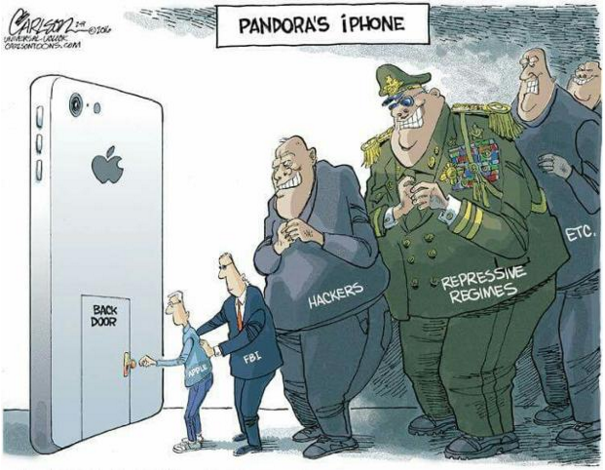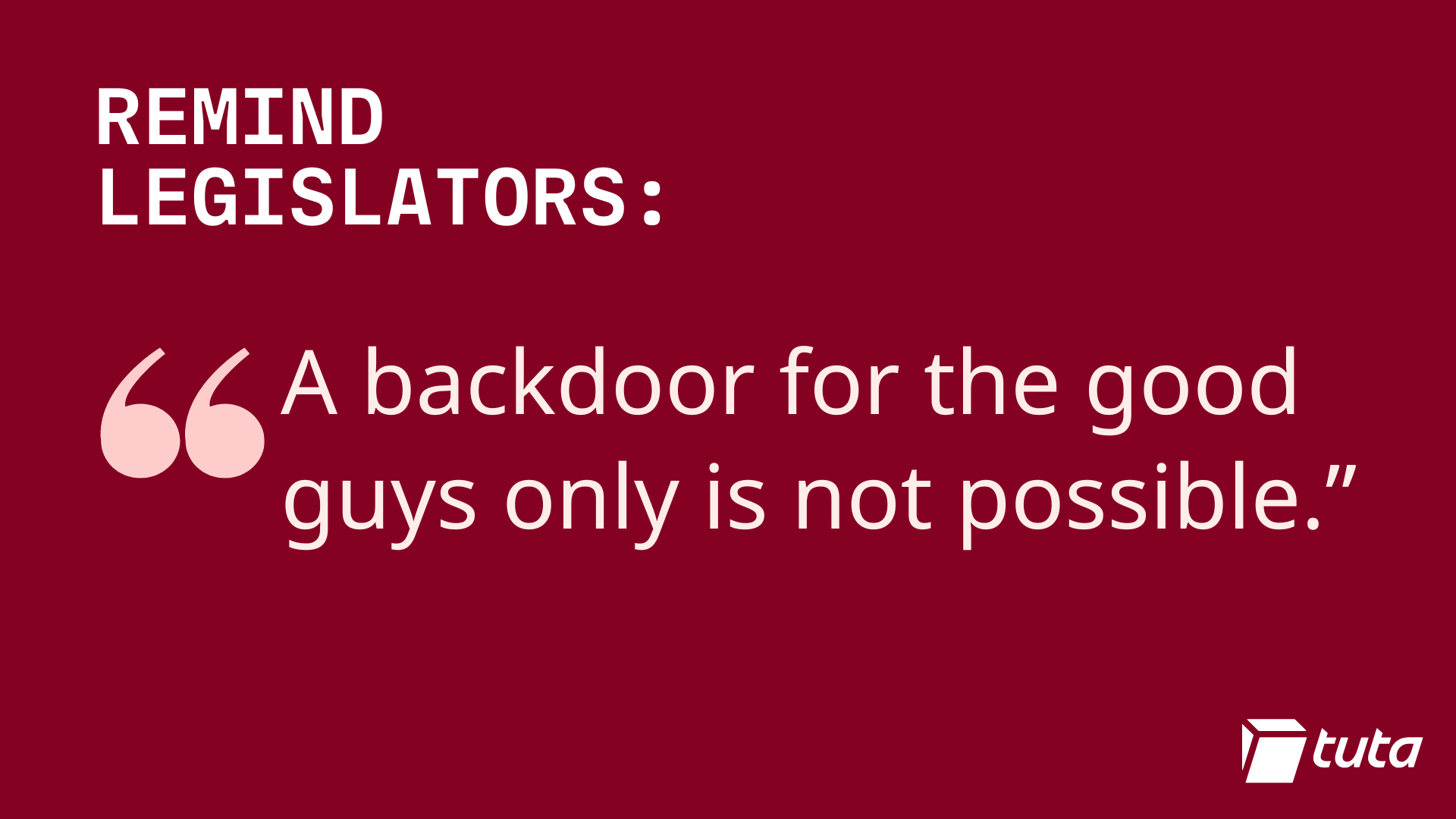Open letter urging Swedish lawmakers NOT to break encryption.
Sweden's latest attack on encryption comes simultaneously with the Swedish Armed Forces speaking up in favor of encryption. If this alone is not enough to reject the legislation, read the open letter to the Swedish Riksdag.
The proposed law, known as the Swedish Data Storage and Access to Electronic Information Legislation, has been made public at a similar time as the Swedish Armed Forces encouraged the use of encrypted chat apps like Signal to protect communication from foreign espionage. A contradiction in itself, politicians still want to force encrypted communication providers like Signal and Tuta Mail to undermine their quantum-resistant encryption.
Today, a broad coalition of civil society organizations, technology companies, and cybersecurity experts is calling on the Swedish Riksdag to reject proposed legislation “Ju2024/02286 Datalagring och åtkomst till elektronisk information”, which threatens to compromise the privacy, security, and fundamental rights of everyone in Sweden and beyond.
”Security experts have warned again and again: If encryption is weakened for law authorities, it is weakened for everyone. A “master key for the good guys only” simply does not exist”, says Matthias Pfau, CEO of Tuta Mail.


Yet, under the proposed law, platforms would face an impossible choice: weaken their security or exit the Swedish market entirely. Already, Signal - one of the most trusted encrypted platforms - has announced it would withdraw from Sweden rather than comply with the law.
Matthias Pfau, CEO at Tuta states: “We would never undermine the quantum-safe encryption of Tuta Mail. And our open source code is proof of that.”
The recent Salt Typhoon hacks, the worst hack in US history where Chinese attackers infiltrated American communications providers’ network to listen in on not-encrypted calls and messages, is proof of why we all need end-to-end encryption. Weakening it now would be akin to lowering one’s defenses at a time of heightened digital threat.
Instead of compromising encryption, the coalition urges lawmakers to invest in modern, targeted investigative tools that respect privacy and strengthen public safety.
The open letter to the Swedish Riksdag ends on exactly this note:
“End-to-end encryption is vital to protecting Sweden’s interests. In light of the severe risks to security, privacy, and human rights, we strongly urge the Riksdag to reject “Ju2024/02286 Datalagring och åtkomst till elektronisk information.” Passing this legislation would damage Sweden’s cybersecurity, digital economy, and commitment to human rights. It would create a legacy of vulnerability that would persist for generations.”
Open Letter to Swedish Riksdag
The undersigned civil society organizations, companies, and cybersecurity experts, including members of the Global Encryption Coalition, urgently call for the Swedish Riksdag to reject the legislation, “Ju2024/02286 Datalagring och åtkomst till elektronisk information.” This legislation, if enacted, would greatly undermine the security and privacy of Swedish citizens, companies, and institutions. Despite its intention of combating serious crime, the legislation presents a dangerous approach which would instead create vulnerabilities that criminals and other malicious actors could readily exploit. Compromising encryption would leave Sweden’s citizens and institutions less safe than before.
The legislation would force companies to store and provide law enforcement with access to their users’ communications, including those that are end-to-end encrypted. The consensus among cybersecurity experts is that complying with this requirement for end-to-end encrypted communications services will be impossible without forcing providers to create an encryption backdoor — akin to a master key that unlocks every door in a building.
The creation of an encryption backdoor creates vulnerabilities that would leave Sweden less safe against cyber threats and foreign adversaries. This concern is echoed by the Swedish Armed Forces, which has stated that access requirements in End-to-end encrypted communication “cannot be fulfilled without introducing vulnerabilities and backdoors that third parties can exploit.”
If passed, the legislation leaves platforms offering end-to-end encrypted services with an impossible choice. They will either need to comply and undermine the security of their services, or they will be forced to leave the Swedish market. In either scenario, the result is less secure and private communications for the Swedish citizens, companies, and institutions who rely on these tools. Over 40% of Swedish Internet users benefit directly from the security and privacy provided by end-to-end encrypted messaging services.
Undermining the confidentiality of end-to-end encrypted services would have a particularly harmful impact on those already at most significant risk: journalists and activists who rely on secure communication to protect sources and organize safely, families and domestic violence survivors who use encryption to shield themselves from abuse, LGBTQ+ individuals who depend on secure platforms for safety and community, and many more who rely on the protection and privacy provided by end-to-end encrypted services. International human rights bodies, including the European Data Protection Board and European Court of Human Rights, have recognized the importance of end-to-end encryption to protect the right to privacy and to promote the exercise of other rights.
Swedish companies, government services, and institutions all benefit from end-to-end encryption. The Swedish Armed Forces recognized this when they recently endorsed the use of Signal, an end-to-end encrypted messaging application, to protect the non-classified communications of national security professionals. If the legislation passes, Signal has already indicated that they would choose to leave the Swedish market rather than comply.
Ensuring the security and privacy of government officials and national security professionals is vital for helping prevent extortion or coercion attempts, which could lead to more significant national security damage. The Swedish Armed Forces have noted in January 2025 that “the country is subject to regular cyberattacks”, and in such an environment, ensuring Swedish citizens, companies, and institutions have access to uncompromised end-to-end encrypted communications is more vital than ever.
Weakening encryption would be akin to lowering defenses during heightened risk. Amid such national security challenges and the fallout of the Salt Typhoon hack, the reliance by the Swedish government, citizens, and businesses on end-to-end encryption to keep themselves safe and secure has never been greater.
Rather than undermining encryption, the government should invest in and utilize modern investigative techniques that are targeted and do not compromise the security of all users. These include enhanced digital forensics, improved data analysis, and international cooperation.
End-to-end encryption is vital to protecting Sweden’s interests. In light of the severe risks to security, privacy, and human rights, we strongly urge the Riksdag to reject “Ju2024/02286 Datalagring och åtkomst till elektronisk information.” Passing this legislation would damage Sweden’s cybersecurity, digital economy, and commitment to human rights. It would create a legacy of vulnerability that would persist for generations.
We implore you to protect Swedish citizens’ communications and fundamental rights, safeguard Sweden’s digital future, and prioritize policies that strengthen rather than weaken cybersecurity. Sweden’s security, prosperity, and freedom depend on it.
Signatories
Access Now
Africa Media and Information Technology Initiative (AfriMITI)
African Academic Network on Internet Policy
Betapersei, SC
Bits of Freedom
Center for the Study of Organized Hate (CSOH)
Centre for Democracy & Technology Europe
Character Works AB
Comunitatea Internet Association
Cyberstorm.global
Danes je nov dan, Inštitut za druga vprašanja
Dataföreningen västra (Swedish Computer Association)
Deutsche Vereinigung für Datenschutz e.V. (DVD)
DFRI (Föreningen för Digitala Fri- och Rättigheter)
Egyptian Initiative for Personal Rights (EIPR)
Electronic Frontier Finland - Effi ry
Electronic Frontier Foundation
Elektronisk Forpost Norge
Encryption Advocates Council
European Digital Rights (EDRi)
European Roma Rights Centre
European Sex Workers Rights Alliance (ESWA)
Fight for the Future
Freedom of the Press Foundation
Global Partners Digital
Homo Digitalis
Index on Censorship
Internet Society
Internet Society Benin Chapter (ISOC BENIN)
Internet Society Cameroon Chapter
Internet Society Capítulo Venezuela
Internet Society Catalan Chapter (ISOC-CAT)
Internet Society Chad chapter
Internet Society Comoros Chapter
Internet Society Dominican Republic Chapter
Internet Society Ecuador Chapter
Internet Society Ethiopia Chapter
Internet Society German Chapter ISOC.DE
Internet Society Ghana Chapter
Internet Society Guinea Chapter
Internet Society Mali Chapter
Internet Society Niger Chapter
Internet Society Norway Chapter
Internet Society Paraguay Chapter
Internet Society Portugal Chapter
Internet Society Puerto Rico Chapter
Internet Society Senegal Chapter
Internet Society Slovenia Chapter
Internet Society Sierra Leone Chapter
Internet Society Sweden Chapter
Internet Society Taiwan Taipei Chapter
Internet Society Togo Chapter
Internet Society Uruguay Chapter
Internet Society Zambia Chapter
IT-Pol Denmark
JCA-NET(Japan)
LGBT Tech
L. Jean Camp, Indiana U
MyData Sweden
Myntex
NetTek Ltd
Omnifi Foundation
OneMore Secure AB
Open Rights Group
OpenMedia
Peergos Ltd
Phoenix R&D GmbH
Politiscope
Proton
Privacy International
Privacy & Access Council of Canada
Quilibrium
Recurity Labs GmbH
SecureCom
SECURECRYPT
SHARE Foundation
SkypLabs
Statewatch
Surfshark
Swedish Network Users Society
Tech for Good Asia
The Cybersecurity Advisors Network (CyAN)
The Tor Project
Thomson Reuters Holdings AB
Tuta Mail
Virtual School on Internet Governance
XPD AB
3 Steps Data
Individual Experts
Viktor Alakörkkö
Vivi Andersson, KTH Royal Institute of Technology
Jan Andersson
Daniel Appelquist, W3C TAG Co-chair and OpenSSF Global Cybersecurity working group co-chair
Martin Bergling, RISE - Research Institutes of Sweden
Anders Boström, Net Insight
Simon Bouget, RISE Research Institutes of Sweden
Carl Magnus Bruhner
Randy Bush, RGnet
Jon Callas, Indiana University
Sofia Celi, Brave
Dr Duncan Campbell, University of Sussex, School of Law Politics and Socioogy,, Brighton, UK
Anders Darander
Per Darnell
Lars Delhage, Nohup AB
Orr Dunkelman, University of Haifa
Javier Ruiz Diaz, Sussex Centre for Law and Technology (SCLT)
Sven Dietrich, City University of New York (CUNY)
Tobias Ekbom, F.d. styrelseledampt Defensor, patenterat deduplicering i kombination med source-side encryption. Arkitekt i cybersäkerhet.
Torbjörn Eklöv
Peter Eriksson, Noproduct AB
Nicola Fabiano, Studio Legale Fabiano
Stephen Farrell, Trinity College Dublin
Dr. Simone Fischer-Hübner, Professor at Karlstad University
Dr. Richard Forno, UMBC
Amir Gaber
Simson L. Garfinkel, Association for Computing Machinery
Marcus Glaad
Dr. Ian Goldberg, University of Waterloo
Dr. Christine Grosse, LTU
Masayuki Hatta, Surugadai University
Leif Henriksson
Kent Illemann, illemann konsult ab
Dr. Leonardo Horn Iwaya, Karlstad University
Prof. Dr.-Ing. Meiko Jensen, Karlstad University
Olle E. Johansson, Edvina AB
Samuel Kelemen, Principal Security Engineer at King
Staffan Kerker, Splisado AB
Gabriel Kihlman, ABC-Klubben
Agnieszka Kitkowska
Håkan Kvarnström, Independent consultant
Susan Landau, Tufts University
Andreas Lindh, Recurity Labs GmbH
Anne-Marie Eklund Löwinder, Amelsec AB
Dr. Kaspar Rosager Ludvigsen, Durham University
Johan Lundberg
Martin Lundgren, University of Skövde
Victor Morel, Chalmers University of Technology
Renzo Navas, IMT Atlantique
Gustav Petersson
Ivan Pettersson, Cybersecurity evangelist, Arrow ECS sweden
Fredrik Pettai
Riana Pfefferkorn, Stanford University
Tobias Pulls, Karlstad University
Dr Gnanajeyaraman Rajaram, Saveetha University
Francisco Blas Izquierdo Riera (klondike), KITS AB and Chalmers University of Technology and University of Gothenburg
Jakob Schlyter, Kirei AB
Dr Jessica Shurson, University of Sussex
Eugene H. Spafford, Purdue University, USA
Daniel Stenberg, the curl project, president of the European Open Source Academy
Mats Strålberg, Inforing AB
Magnus Ström
Peter Sunde Kolmisoppi, ex The Pirate Bay/Wikileaks
Marco Tiloca, RISE Research Institutes of Sweden
Ulrich Wisser
Paul Wouters, IETF Security Area Director
Mališa Vučinić, Inria
Dr. Karin Zackari, Lund University
Daniel Zappala, Brigham Young University

